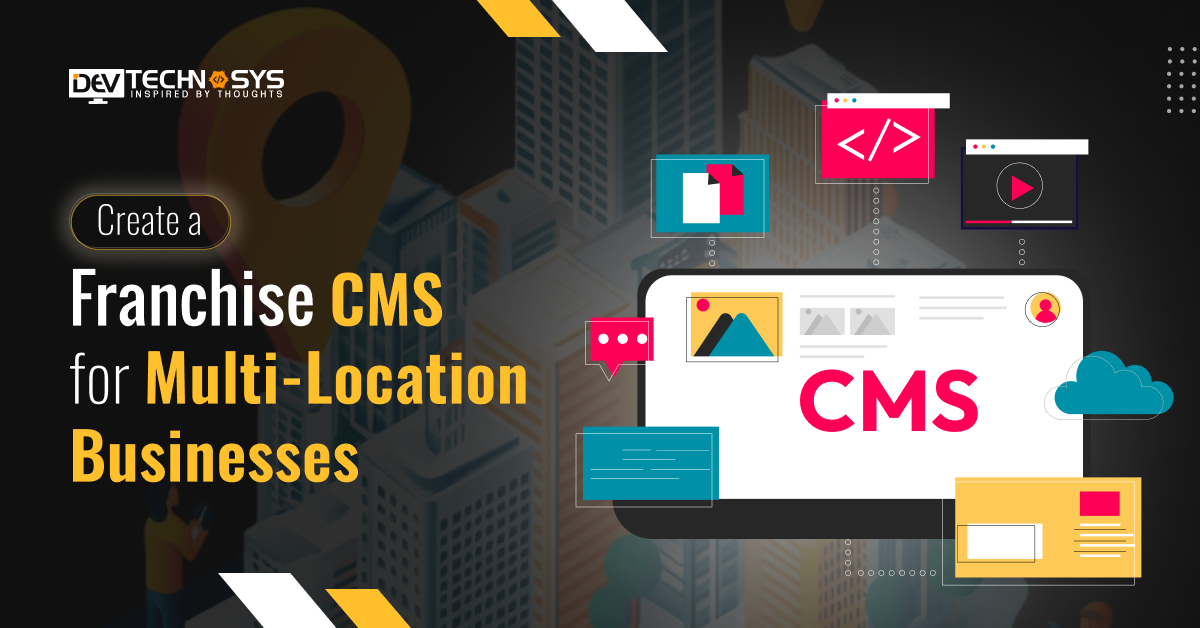“Deliver verified and quality content by creating a Franchise CMS platform.”
There is a lot of content going on various online websites and digital platforms. The space is getting less and the content is getting huge. Additionally, businesses are expanding their domains in different regions. So, for management you need to create a Franchise CMS for multi-location businesses. This can help entrepreneurs to perform various functions like monitoring and judging quality of the content.
It is important for investors who want to start an online business to know the demand of Content Management Systems. Almost all working professionals whether employees or company owners are using Franchise CMS platforms at a large scale.
So, using existing ones may be a great choice for you. But, investment in developing a similar CMS clone is highly beneficial because you will have all the access to the content. In this blog, we will understand all the topics related to the development of a Franchise CMS. Let’s jump on.
What is a Franchise CMS?
A Franchise CMS is a platform that helps entrepreneurs to manage multi-location businesses. It offers a lot of features to publish good quality content and improve the SEO score with ranking. Businesses can invest in franchise management software development services to launch a new platform with dynamic content management solutions.
How is it Different from Regular CMS?
Franchise CMS is a standard and modified version of regular CMS platforms. Software like Hubspot CMS is the best example of a Franchise content management platform. WordPress is a regular CMS with open-source features and services.
Market Stats on CMS Software
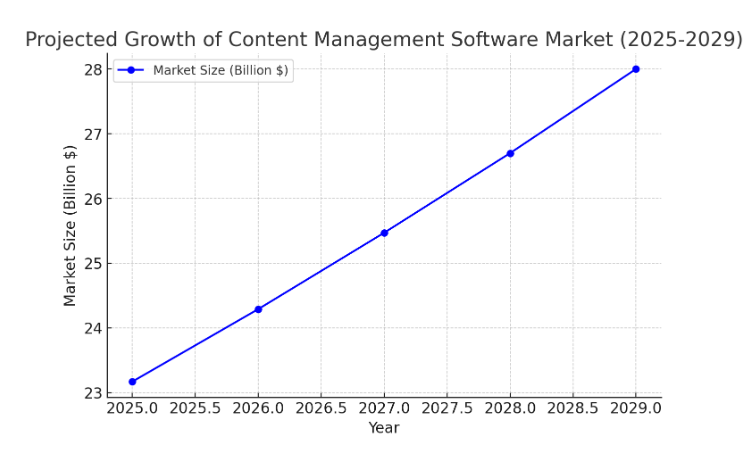
- In 2025, the content management software industry is anticipated to generate $23.17 Billion in sales.
- By 2029, the market is expected to grow at a rate of 84% CAGR between 2025 and 2029 of reaching a volume of $28.00 Billion.
- The market for content management software is expected to reach $6.45 per employee on average by 2025.
- Big US companies had a global market share of $23.17 billion.
- The United States is predicted to produce the highest amount of revenue globally, with $12.46 Billion in 2025.
- Globally, the market for content management software has a high scope for all industries.
- The USA is now leading the global market for content management software.
What are the Challenges With Multi-Location Businesses?
Expansion of the business domain is necessary for sure, but multiple challenges await for you in the path. It is important for businesses to find those challenges and resolve them timely by targeting suitable solutions. Here we will discuss major challenges and their solutions:
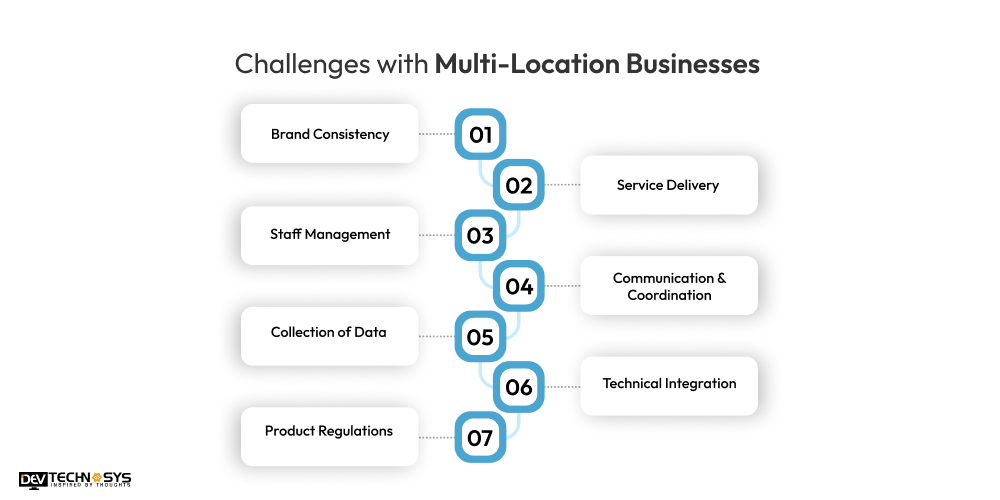
1. Brand Consistency
Maintaining consistency in your brand is very important to fulfill desired client needs. It helps you to deliver quality content with less effort. But managing multiple business domains may be a tough task for small businesses and can deviate them from success.
Solution: Make a separate CMS portal for every domain and focus on region-specific content to increase client attention.
2. Service Delivery
You cannot deliver the same services in all regions because every person has different needs and business interests. Your delivery of services must vary in all the domains which requires high investment marketing.
Solution: You must identify various trends popular in a particular location and then implement services accordingly.
3. Staff Management
Deploying the same people on all domains may result in mismanagement of content and lowers the quality. Additionally, this can also lead to downfall of user traffic due to increase in the work pressure and reverse business ratings.
Solution: It is important to divide the tasks and domains between the employees based on their experience, knowledge, and performance.
4. Communication & Coordination
Without a Franchise CMS, it is nearly impossible to maintain quality communication between the clients and content developers. For example a user wants to build a mobile app, then its mobile app development cost may be high due to lack of coordination.
Solution: A CMS provides dynamic packages with added plugins to conduct an easy communication with file sharing services.
5. Collection of Data
If you want to collect data or any other informational content from multiple domains, then it is difficult to store and access them. In addition to this, you cannot easily understand the information without the use of a dedicated software.
Solution: For collecting content data separately you need to implement a filter that can sort the information based on different regions.
6. Technical Integration
To maintain the legacy of the content, businesses should not use common tools and technologies. Additionally, it may result in invariability if you are using a Franchise Content Management System for region-specific domains.
Solution: Use cost-effective technology stack with appropriate strategy for delivering content on every domain.
7. Product Regulations
Every region has its own security regulations and compliances that primarily focuses on user safety and privacy. If you are having multiple domains without a Franchise CMS then getting security clearance is a time taking and costly process.
Solution: Entrepreneurs must study regulations of a particular country before introducing their domain to prevent business loss.
Key Features of Franchise CMS
Knowing the features of a Franchise CMS is very important for businesses so they can easily manage the cost. In this section, we are discussing major CMS features for multi-location businesses:
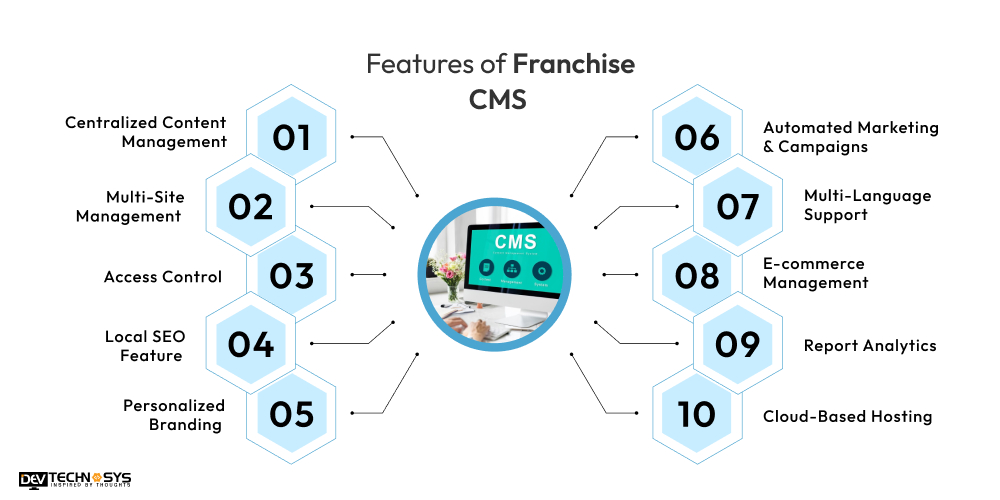
1. Centralized Content Management
A Franchise CMS allows businesses to manage content across multiple franchise locations from a single dashboard. It ensures brand consistency and enables content customization for each location.
2. Multi-Site Management
This feature lets franchise owners create and manage multiple franchisee websites under one platform. WordPress is the best CMS for franchise business that uses its own website while following a standardized brand structure.
3. Access Control
A Franchise CMS provides tiered user permissions, ensuring that franchise owners and managers have appropriate access. So, they can edit content, manage promotions, or update business information.
4. Local SEO Feature
Franchise CMS come with local SEO tools that allow optimizing individual pages for regional keywords. Businesses can use Google My Business listings with geo-specific content to improve rankings.
5. Personalized Branding
The system ensures brand uniformity by offering predefined templates and structured content modules. So, you can approach an android app development company to use this feature without altering key branding elements.
6. Automated Marketing & Campaigns
Integrated marketing automation allows franchise owners to push email campaigns, social media posts, and promotions across multiple locations. It permits franchisees to run localized marketing brands.
7. Multi-Language Support
A Franchise CMS enables multi-language support so franchises operating in different regions can serve content in their local languages. It ensures better customer engagement with regional requirements.
8. E-commerce Management
For franchises with online stores, the CMS supports e-commerce integration. It allows them to manage online orders, product catalogs, and payment processing which ensures a unified shopping experience.
9. Report Analytics
A multi-location business CMS offers centralized data tracking and analytics and provides insights like customer behavior. It performs franchise performance, and marketing campaigns to help business strategies.
10. Cloud-Based Hosting
A Franchise CMS is designed to grow with the business, offering cloud-based hosting, API integrations, and scalable infrastructure. So, you can accommodate new franchise locations seamlessly.
How to Build a Franchise CMS?
In this section, we are going to discuss a general pattern to create a Franchise CMS for multi-location businesses. So, let’s move and understand the development process deeply.
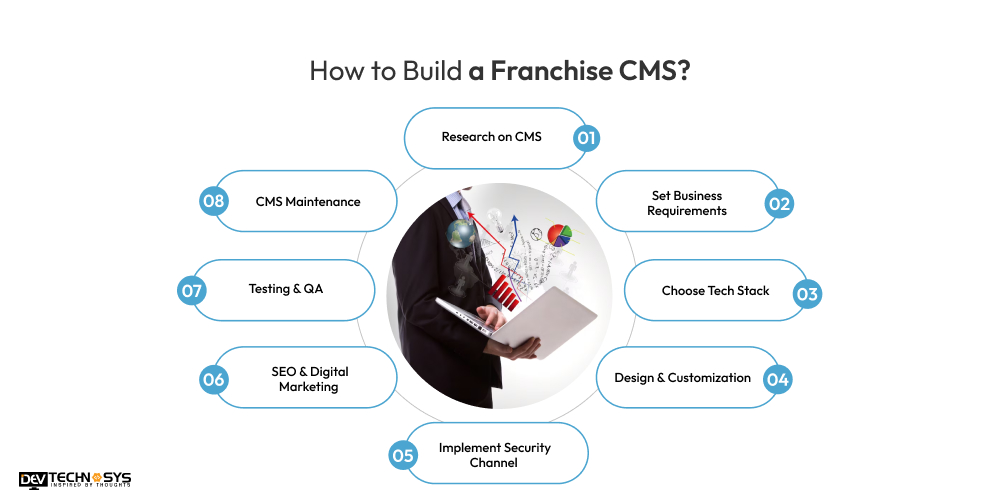
1. Research on CMS
Before starting the development process, you need to perform a thorough research on CMS and other related concepts. You can observe different use cases that are currently available in the market. So, it will be easy for you to identify major requirements and platform specifications.
- Study various CMS trends and use cases.
- Why is it important to develop a CMS platform?
- Who is my target audience?
2. Set Business Requirements
This will help you to improve your business model and fixing budget before investing money to create Franchise CMS platforms. You can also specify maintenance services, cost, and desired tools by making a blueprint of the whole development process and preparing documentation.
- Is it necessary to create a blueprint?
- What can I include in the business development plan?
- Which is the most popular Franchise CMS platform?
3. Choose Tech Stack
Selecting the right tech stack is crucial for developing a scalable and efficient Franchise CMS. Businesses should hire a CMS development company to choose precise tools. For example PHP, Python, or Node.js for backend development, React or Angular for frontend, and MySQL or MongoDB for database management.
- How to identify best tools for developing CMS platforms?
- Should I hire a Franchise CMS development company?
- Which tool is best for backend integration?
4. Design & Customization
A user-friendly and customizable design ensures that each franchise location can maintain its identity while adhering to brand guidelines. The CMS should provide flexible templates, drag-and-drop builders, and customization options for branding, content management, and regional adaptation.
- How to design a Franchise CMS platform?
- What are the major customizations available for CMS portals?
- Are plugins included in CMS development?
5. Implement Security Channel
Security is a major stage in the process to make a Franchise CMS for multi-location businesses that protects customer data and transactions. Implement SSL encryption, role-based access control, multi-factor authentication (MFA), and GDPR-compliant data protection measures to prevent cyber threats and unauthorized access.
- How to secure content data?
- What are the necessary regulations for keeping content safe?
- What is the use of security algorithms?
6. SEO & Digital Marketing
The CMS should include SEO-friendly URL structures, meta-tag management, keyword optimization, and local SEO tools to enhance online visibility. You can hire dedicated developers to integrate the system with Google My Business, analytics tools, and social media platforms for digital marketing.
- What do you mean by SEO?
- Which is the best digital marketing tool?
- Can I integrate social media with Franchise CMS platforms?
7. Testing & QA
Before launch, conduct comprehensive testing, including performance, security, and usability testing, to identify and resolve issues. Load testing ensures the CMS can handle multiple franchises, while security audits help detect vulnerabilities in the system.
- What is the role of beta testing?
- How to assure the quality of the CMS platform?
- Can CMS platforms handle multiple queries?
8. CMS Maintenance
Regular updates, patches, and performance monitoring are necessary to ensure smooth operation. Businesses should provide technical support, feature updates, and backup solutions to enhance security and maintain system efficiency over time.
- How to maintain Content management systems?
- What is the need to update features of a CMS platform?
- Can I improve the security of the content management platform?
Best Practices to Manage a Franchise CMS
Once you have developed a Franchise CMS portal, it is important to manage the platform to get continuous results and updates. Here, we will find out best practices for managing a Franchise CMS:
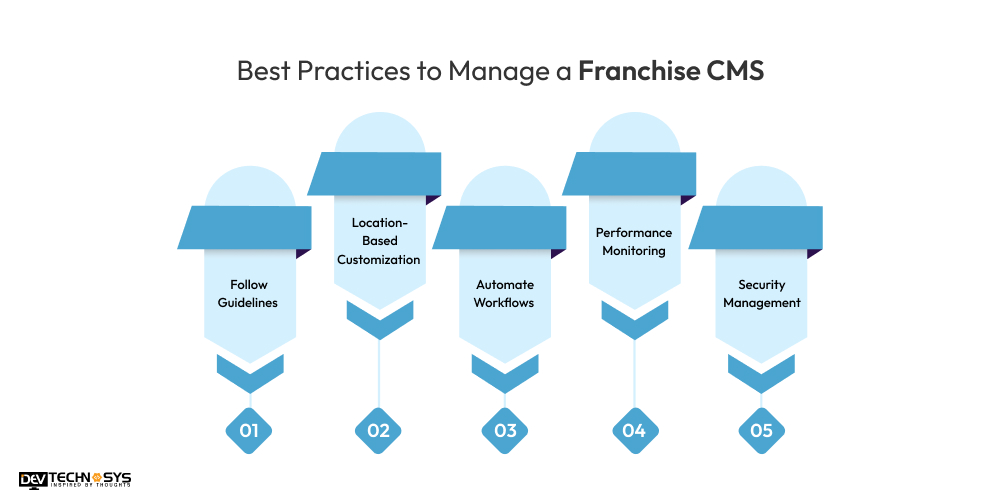
1. Follow Guidelines
It is important to follow proper guidelines to build a franchise CMS for multi-location businesses with automated post-maintenance services. Entrepreneurs should keep their resources safe for managing the CMS platform without extra investment.
2. Location-Based Customization
Making changes based on the demands and needs in a specific region is necessary for businesses. CMS platforms can be modified easily through custom channels and plugins. This makes handling of content management platforms comfortable
3. Automate Workflows
Through automation of tasks like content posting, SEO performance, and link generation, management of Franchise CMS becomes easy. You should contact an iPhone app development company to make all the processes work on their own.
4. Performance Monitoring
You need to monitor performance of the CMS platform through various online AI-powered tools. This provides strong analytics on dashboard management and content quality. By using these tools you can easily check errors and resolve them.
5. Security Management
Security of a Franchise CMS platform must be ensured to prevent loss of data. This is one of the most widely used and important practices for entrepreneurs. Various authentication methods are available to secure content data and reduce the maintenance cost.
What is the Cost to Create a Franchise CMS for Multi-Location Businesses?
The cost to create a Franchise CMS for multi-location businesses is dependent on multiple factors. They can increase or decrease Franchise CMS development cost based on the industrial demands. In this section, we will understand them and observe an estimated pricing model for each:
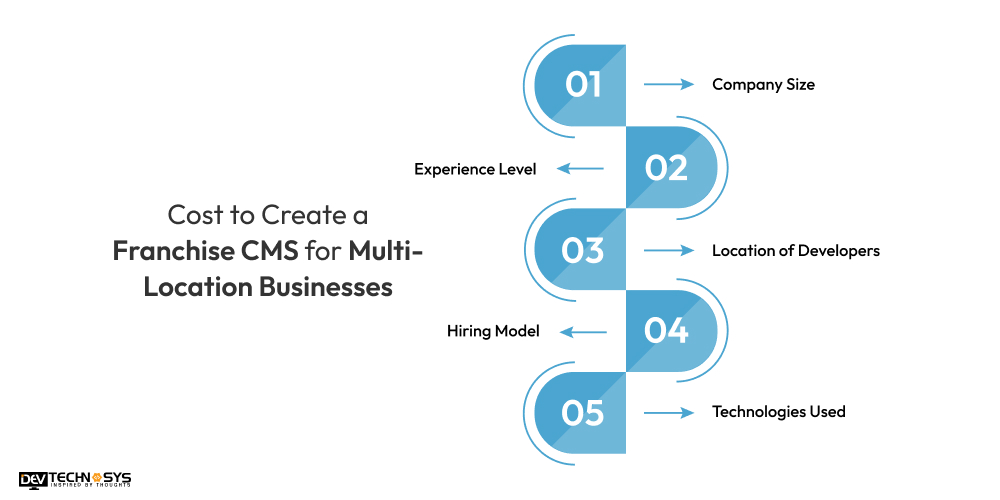
1. Company Size
If you are selecting a small size company for building a Franchise CMS then the development cost is less. But, the quality of the product may get compromised. So, you can choose a medium-sized company with a high number of employees to get a dynamic CRM at affordable prices. A big enterprise may be costly for businesses.
| Company Size | Estimated Cost |
| Small Enterprises | $8,000-$12,000 |
| Medium-sized Enterprises | $12,000-$16,000 |
| Big Enterprises | $16,000-$20,000 |
2. Experience Level
You need to hire experienced developers for creating market-ready CRM platforms. The CMS development cost rises up with an increase in the experience level. Experts and professionals charge high labor costs to create Franchise CMS platforms.
| Team’s Expertise Level | Cost Estimation (USD) |
| Junior/Entry-Level | $8000-$12000 |
| Mid-Level/Experienced | $12000-$16000 |
| Senior/Expert | $16000-$20000 |
| Professional | $20000-$24000 |
3. Location of Developers
In western countries like the USA and Brazil, the CMS development cost is comparatively higher than in regions like India and the UAE. This is because countries in eastern regions offer cheap labor and an affordable development model. But, western regions have complex structures that raise the cost.
| Location Factor | Estimated Cost |
| USA | $25000-$30000 |
| Australia | $20000-$25000 |
| India | $5000-$12000 |
| UK | $15000-$20000 |
| UAE | $8000-$15000 |
| Brazil | $12000-$16000 |
4. Hiring Model
Businesses can select a hiring model based on their requirements and specifications. So, they can manage the development cost and complete the development process within the deadline. Outreaching developers is highly costly but ensures security. In-house developers are an affordable option with both quality work and low cost.
| Hiring Factor | Estimated Cost |
| In House Team | $5,000-$8,000 |
| Full-Time Freelancers | $3,500-$5,000 |
| Developer Outreach | $8,000-$15,000 |
5. Technologies Used
Using advanced technologies like AI, Blockchain, and others influences the Franchise CMS development cost. The price increases as the number of tools rises. The use of security algorithms highly affects the rate of developing simplified Franchise CMS platforms.
| Technical Model | Estimated Cost |
| Artificial Intelligence | $30,000-$40,000 |
| Blockchain | $35,000-$50,000 |
| Cloud Computing | $40,000-$45,000 |
| Cyber Security | $45,000-$50,000 |
Top CMS Platforms for Multi-Location Businesses
There are multiple CMS platforms available that are commonly used in various industries. So, let’s discuss some of the major reputed and highly utilized CMS portals in this section:
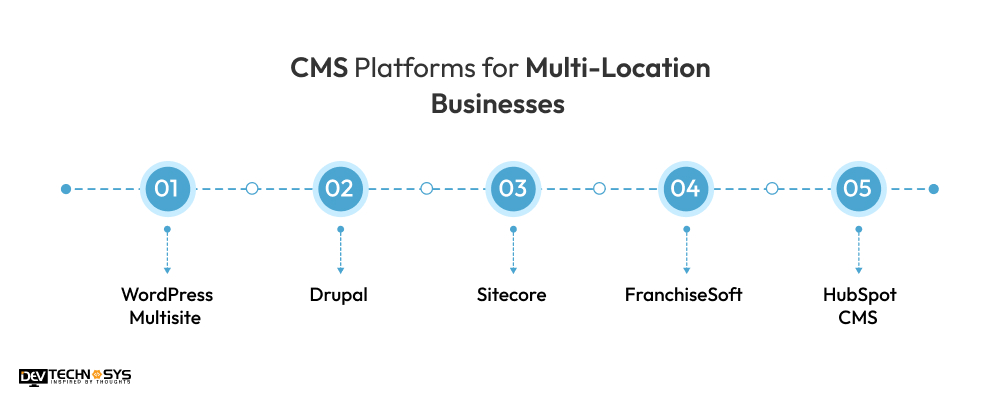
1. WordPress Multisite
WordPress Multisite is a Franchise website platform that allows businesses to manage multiple franchise websites from a single dashboard. It offers flexibility, extensive plugin support, and customizable themes for different locations.
2. Drupal
Drupal is a powerful open-source CMS platform that provides enterprise-level security, scalability, and multi-site management. Additionally, it delivers advanced customization and control to businesses.
3. Sitecore
Sitecore is an AI-driven, enterprise-grade Franchise CMS platform that excels in personalized digital experiences and multi-location content management. You can hire mobile app developers to study customer engagement analytics with Sitecore.
4. FranchiseSoft
It is specifically designed for franchise businesses that are integrated with content management, CRM, marketing automation, and analytics. So, entrepreneurs can streamline multi-location operations and tasks.
5. HubSpot CMS
HubSpot CMS offers built-in marketing automation, SEO tools, and CRM integration. It is an excellent choice for franchises looking to optimize digital marketing and customer engagement through automated tools.
Leading Future Trends in Franchise CMS
Businesses must be happy to know that Franchise CMS is the future for all the industries. So, it is very important to understand those trends before expanding your domain. Here, are some of them discussed:
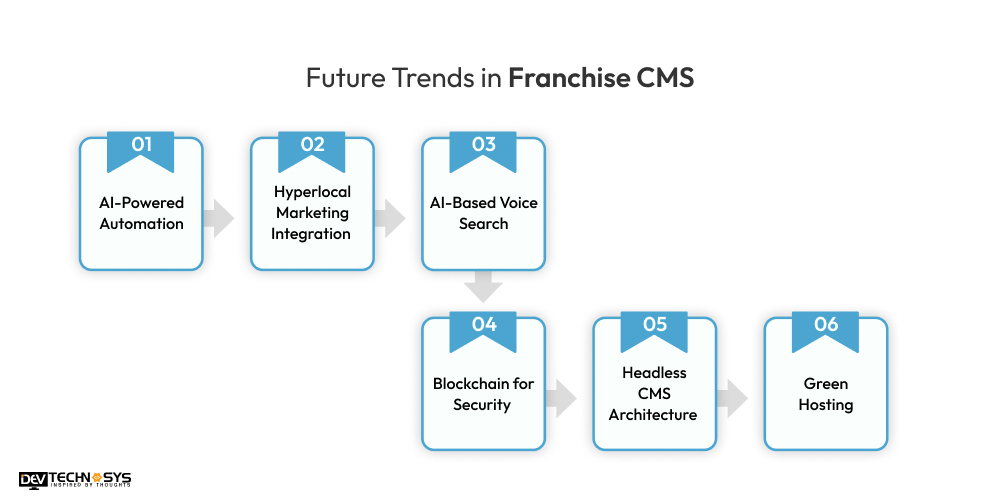
1. AI-Powered Automation
Artificial intelligence will enhance Franchise CMS platforms by automating content personalization. Additionally, it can manage customer interactions and predictive analytics to improve engagement and efficiency.
2. Hyperlocal Marketing Integration
Advanced geo-targeting and localized marketing tools will enable franchisees to run hyperlocal campaigns. Using multi-location website management services can optimize search rankings and customer outreach based on regional preferences.
3. AI-Based Voice Search
With the rise of voice assistants like Alexa and Google Assistant, Franchise CMS platforms will incorporate voice search optimization. In this, a mobile app development company can also assist you for implementing AI chatbots to enhance customer interactions.
4. Blockchain for Security
Blockchain technology will be used to ensure secure transactions, franchise contract management, and data integrity. So, it will be beneficial for businesses to make their operations more transparent and fraud-resistant.
5. Headless CMS Architecture
Franchise businesses will increasingly adopt headless CMS architectures to deliver seamless content across different platforms. This includes websites, mobile apps, smart devices, and emerging digital platforms.
6. Green Hosting
With growing environmental concerns, Franchise CMS providers will shift towards eco-friendly cloud hosting. So they can meet corporate responsibility goals with carbon-neutral infrastructure and sustainable digital practices.
In a Nutshell!!
Let’s now finally conclude our blog by reviewing some major observations that may help you to create a Franchise CMS for multi-location businesses at an affordable cost. Businesses may apply them by consulting with experienced developers.
- Development of a Franchise CMS platform requires high investment.
- Proper and continuous management is needed after developing a Custom CMS for Franchise.
- If you are working on websites then contacting a Web development company is beneficial.
- You can make money through CMS platforms by providing licensing and membership plans.
- Following future trends is mandatory to keep business content updated and qualified.
These points are not complete but enough to help you out in the development process. It will be easy for you to manage all the digital content running on the internet and make changes accordingly.
FAQs
1. How Does a Franchise CMS work?
Entrepreneurs must know the working of a Franchise CMS that helps them to manage multi-location businesses. It works in the following manner:
- Content is kept at a central level.
- Authentication of content is performed.
- Addition of multiple sites.
- Automation of SEO and other marketing tasks.
- Track performance of the content and websites.
2. What are the Benefits to Create a Franchise CMS for Multi-Location Businesses?
The major benefits of developing a Franchise CMS are as follows:
- Businesses get centralized control over the content.
- It is easy to improve marketing strategies.
- Gives efficiency and saves branding cost.
3. How to Ensure Security of Data Through a Franchise CMS?
You can provide data security through the below privacy measures:
- Implement multi-factor authentication and user control.
- Update system with suitable security patches.
- Manage performance audits for securing user data.
4. What are the Technologies Used to Build a Franchise CMS?
Major technologies for building a Franchise CMS are listed below:
- Cloud Infrastructure: AWS, Microsoft Azure, and Google Cloud.
- Database Tools: MySQL and MongoDB.
- Backend Technologies: Node.Js and Django.
- AI Tools: Chatbots, NLP, and CRM integrations.
5. Can a Franchise CMS Support Multiple Languages?
A Franchise CMS provides content in multiple languages and supports regional customization of content-based services. Highly advanced CMS supports automatic content translation, location-specific content, and human-centric SEO helping businesses to target audiences in large numbers.
6. Is Using a Franchise CMS Free?
Franchise CMS platforms provide limited features for free. Open-source CMS sites like WordPress and Drupal require subscriptions for features like paid plugins. To implement advanced services like security, you have to go on premium sites such as Hubspot with expensive pricing.
